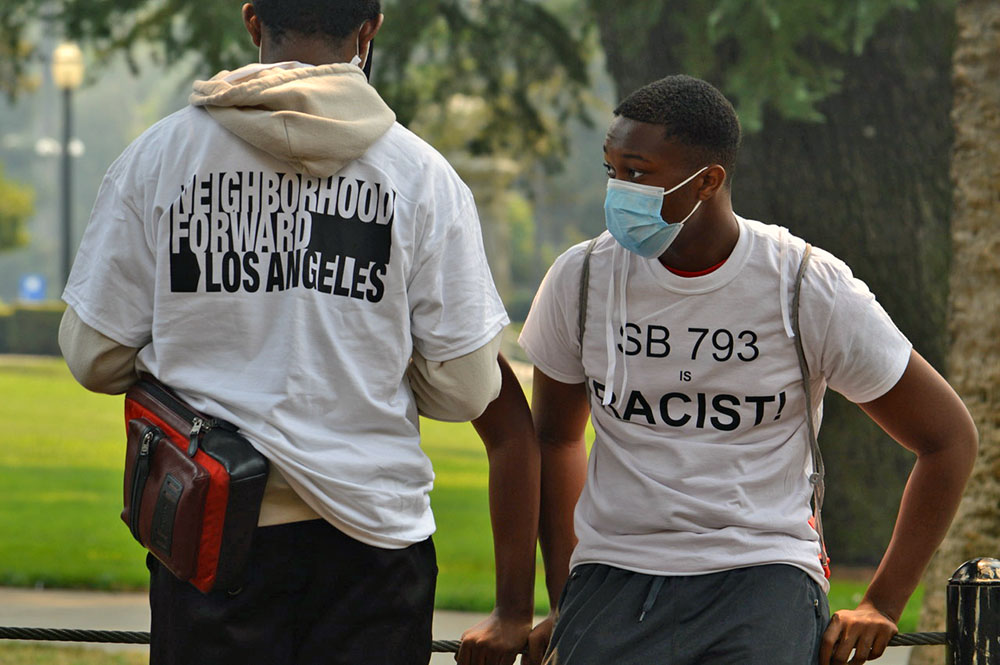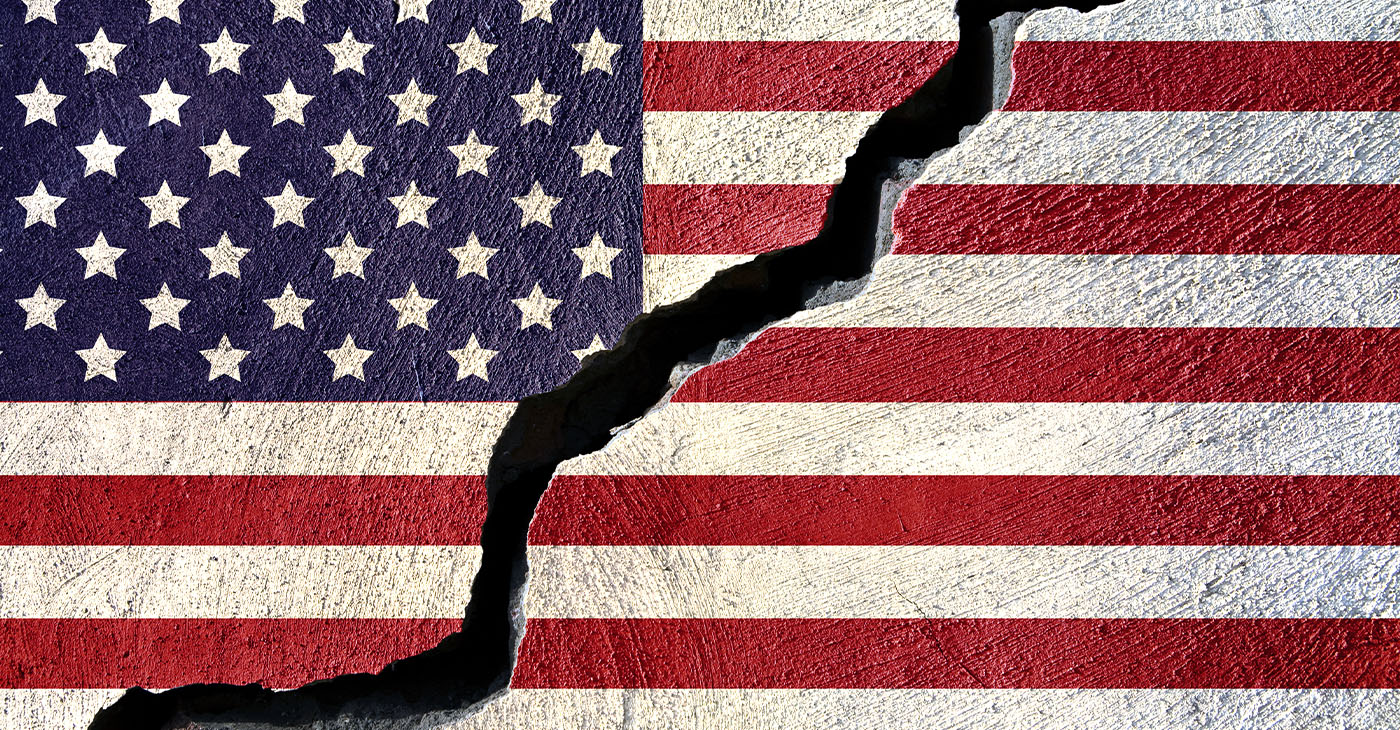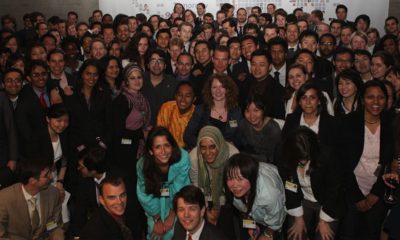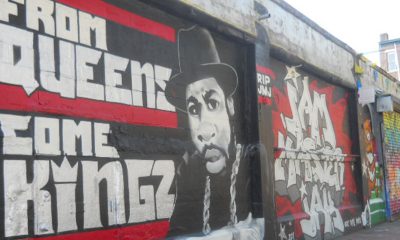#NNPA BlackPress
Activists Say Banning Newport, Other Flavored Cigarettes Puts Black Lives in Danger

Eric Garner’s mother Gwendolyn Carr says, for Black Men, selling a single cigarette, known as “loosey,” can lead to an arrest, a prison sentence or even death.
Six years ago, a police officer put her son in a chokehold and strangled him to death for allegedly selling illegal cigarettes on Staten Island, a borough of New York City.
Now, Carr is speaking out in a new video against California Senate Bill (SB) 793, which she says will create the same circumstances – the illegal sale and use of menthol cigarettes and aggressive, racially-biased law enforcement — that led to her son’s death. If the Senate passes the bill and Gov. Newsom signs it into law, it would ban the sale of menthol tobacco and other flavored cigarette products.
“A new law would criminalize menthol cigarettes, which Black people smoke almost exclusively, giving police officers another excuse to harm and arrest any Black man, woman or child they choose,” Carr says in the video opposing SB 793. “A bad law has consequences for mothers like me.”
Carr is not alone in her opinion of the bill. Across California, there is opposition to SB 793, which, if passed, would become the country’s strongest restriction on flavored tobacco products, including Newport, Kool and Salem cigarettes — three brands Blacks disproportionately smoke.
Old and young, faith leaders, retired law enforcement officers, and civil rights activists came together to protest SB 793. At protests in Los Angeles and Sacramento on Aug. 20, they called out the inherent discrimination coded into the language and spirit of SB 793, which California Sen. Jerry Hill (D-San Mateo) authored.
“The goal of this protest is to ensure we are heard,” said Rev. K.W. Tulloss, President of Baptist Ministers Conference Los Angeles and co-founder of Neighborhood FORWARD, a community-based social action organization. “SB 793 is a bad bill that’s not good for California. The unintended consequences of this legislation are real. Bills like this take us backward.”
But on the same day of the protests, the Assembly Appropriations Committee passed the bill, sending the bill to the full Assembly for consideration.
The rallies were two in a series of three held against SB793. The first one was held in front of the home of California Assembly Speaker Anthony Rendon (D-Lakewood).
Like Carr, people and organizations that oppose SB 793 say it is discriminatory because some adult tobacco products — those preferred by whites – are exempted from the ban.
Meanwhile, the tobacco products preferred by African American adult smokers, menthol cigarettes, are included in the ban. Exemptions in SB 793 include shisha tobacco, which is used in hookah water pipes, premium tobacco, and loose-leaf tobacco.
The retail sale of flavored handmade premium cigars with a minimum price of $12 are also not prohibited under this bill.
Some California residents say that the exemptions for certain kinds of tobacco nearly mirror laws that unequally penalized people for selling or possessing the same amounts of crack cocaine and powdered cocaine.
In 1986, the federal government passed the Anti-Drug Abuse Act, which mandated stiffer punishments for people who sold crack cocaine, the rock form of the drug, which more Blacks used. Penalties for possessing or distributing cocaine powder, preferred by whites, were much lighter. Distributing just five grams of crack triggered a federal mandatory minimum prison sentence of 5 years. But it required 500 grams of cocaine for a distributor to receive a federal prison sentence of the same length of time – a 100:1 disparity.
Law Enforcement Action Partnership (LEAP) and the National Organization of Black Law Enforcement (NOBLE) agree that the bill has a racist element to it. They say the bill demonstrates clear discrimination and preferential treatment between two tobacco products preferred by two different cultural groups.
“We will not and cannot stand for more policies that resemble another Black tax yet find a way to make concessions and amendments for certain groups,” Rev. Tulloss said. “Hookah is exempted, yet menthol cigarettes are not. The Speaker can make this bill fair and that’s all we’re asking.”
Existing law prohibits a person from selling or otherwise furnishing tobacco products to a person under 21 years of age. It also prohibits the use of tobacco products in county offices of education, on charter school or school district property, or near a playground or youth sports event.
If SB 793 passes, each violation of the law would be punishable by a fine of $250.
“Using candy, fruit, and other alluring flavors, the tobacco industry weaponized its tactics to beguile a new generation into nicotine addiction while keeping longtime users hooked. SB 793 breaks Big Tobacco’s death grip,” said Hill said after the Senate voted 33-4 to advance the bill to the Assembly last month.
An estimated seven out of 10 African American youth ages 12 to 17 years smoke menthol cigarettes, according to the Center for Disease Control and Prevention (CDC). In addition, African American adults make up the largest percentage of menthol cigarette users compared to other racial and ethnic groups, the CDC says.
The coalition of SB 793 supporters include the Office of Lieutenant Gov. Eleni Kounalakis, the Tobacco-Free Kids Action Fund, the American Cancer Society Cancer Action Network, the American Heart Association, the American Lung Association, and the Common Sense Kids, who are all bill sponsors.
“SB 793 coauthors, cosponsors, African American thought leaders in government, health, the faith community, science, the arts and among our youth, as well as other supporters, have provided strong counterpoints to the obfuscation,” Hill stated. “We are confident that together we can ensure the strongest tobacco control restrictions in the country become California law.”
#NNPA BlackPress
Remembering George Floyd
#NNPA BlackPress
OP-ED: Oregon Bill Threatens the Future of Black Owned Newspapers and Community Journalism
BLACKPRESSUSA NEWSWIRE — Nearly half of Oregon’s media outlets are now owned by national conglomerates with no lasting investment in local communities. According to an OPB analysis, Oregon has lost more than 90 news jobs (and counting) in the past five years. These were reporters, editors and photographers covering school boards, investigating corruption and telling community stories, until their jobs were cut by out-of-state corporations.

By Dr. Benjamin F. Chavis, Jr.
President and CEO, National Newspaper Publishers Association
For decades, The Skanner newspaper in Portland, the Portland Observer, and the Portland Medium have served Portland, Oregon’s Black community and others with a vital purpose: to inform, uplift and empower. But legislation now moving through the Oregon Legislature threatens these community news institutions—and others like them.
As President and CEO of the National Newspaper Publishers Association (NNPA), which represents more than 255 Black-owned media outlets across the United States—including historic publications like The Skanner, Portland Observer, and the Portland Medium—l believe that some Oregon lawmakers would do more harm than good for local journalism and community-owned publications they are hoping to protect.
Oregon Senate Bill 686 would require large digital platforms such as Google and Meta to pay for linking to news content. The goal is to bring desperately needed support to local newsrooms. However, the approach, while well-intentioned, puts smaller, community-based publications at a future severe financial risk.
We need to ask – will these payments paid by tech companies benefit the journalists and outlets that need them most? Nearly half of Oregon’s media outlets are now owned by national conglomerates with no lasting investment in local communities. According to an OPB analysis, Oregon has lost more than 90 news jobs (and counting) in the past five years. These were reporters, editors, and photographers covering school boards, investigating corruption, and telling community stories, until their jobs were cut by out-of-state corporations.
Legislation that sends money to these national conglomerate owners—without the right safeguards to protect independent and community-based outlets—rewards the forces that caused this inequitable crisis in the first place. A just and inclusive policy must guarantee that support flows to the front lines of local journalism and not to the boardrooms of large national media corporations.
The Black Press exists to fill in the gaps left by larger newsrooms. Our reporters are trusted messengers. Our outlets serve as forums for civic engagement, accountability and cultural pride. We also increasingly rely on our digital platforms to reach our audiences, especially younger generations—where they are.
We are fervently asking Oregon lawmakers to take a step back and engage in meaningful dialogue with those most affected: community publishers, small and independent outlets and the readers we serve. The Skanner, The Portland Observer, and The Portland Medium do not have national corporate parents or large investors. And they, like many smaller, community-trusted outlets, rely on traffic from search engines and social media to boost advertising revenue, drive subscriptions, and raise awareness.
Let’s work together to build a better future for Black-owned newspapers and community journalism that is fair, local,l and representative of all Oregonians.
Dr. Benjamin F. Chavis Jr., President & CEO, National Newspaper Publishers Association
#NNPA BlackPress
Hate and Chaos Rise in Trump’s America
BLACKPRESSUSA NEWSWIRE — Tactics ranged from local policy manipulation to threats of violence. The SPLC documented bomb threats at 60 polling places in Georgia, traced to Russian email domains.

By Stacy M. Brown
Black Press USA Senior National Correspondent
The Southern Poverty Law Center has identified 1,371 hate and antigovernment extremist groups operating across the United States in 2024. In its latest Year in Hate & Extremism report, the SPLC reveals how these groups are embedding themselves in politics and policymaking while targeting marginalized communities through intimidation, disinformation, and violence. “Extremists at all levels of government are using cruelty, chaos, and constant attacks on communities and our democracy to make us feel powerless,” said SPLC President Margaret Huang. The report outlines how hard-right groups aggressively targeted diversity, equity, and inclusion (DEI) initiatives throughout 2024. Figures on the far right falsely framed DEI as a threat to white Americans, with some branding it a form of “white genocide.” After the collapse of Baltimore’s Francis Scott Key Bridge, a former Utah legislator blamed the incident on DEI, posting “DEI = DIE.”
Tactics ranged from local policy manipulation to threats of violence. The SPLC documented bomb threats at 60 polling places in Georgia, traced to Russian email domains. Similar threats hit Jewish institutions and Planet Fitness locations after far-right social media accounts attacked them for trans-inclusive policies. Telegram, which SPLC describes as a hub for hate groups, helped extremists cross-recruit between neo-Nazi, QAnon, and white nationalist spaces. The platform’s lax moderation allowed groups like the Terrorgram Collective—designated terrorists by the U.S. State Department—to thrive. Militia movements were also reorganized, with 50 groups documented in 2024. Many, calling themselves “minutemen,” trained in paramilitary tactics while lobbying local governments for official recognition. These groups shared personnel and ideology with white nationalist organizations.
The manosphere continued to radicalize boys and young men. The Fresh & Fit podcast, now listed as a hate group, promoted misogyny while mocking and attacking Black women. Manosphere influencers used social media algorithms to drive youth toward male-supremacy content. Turning Point USA played a key role in pushing white nationalist rhetoric into mainstream politics. Its leader Charlie Kirk claimed native-born Americans are being replaced by immigrants, while the group advised on Project 2025 and organized Trump campaign events. “We know that these groups build their power by threatening violence, capturing political parties and government, and infesting the mainstream discourse with conspiracy theories,” said Rachel Carroll Rivas, interim director of the SPLC’s Intelligence Project. “By exposing the players, tactics, and code words of the hard right, we hope to dismantle their mythology and inspire people to fight back.”
Click here for the full report or visit http://www.splcenter.org/resources/guides/year-hate-extremism-2024.
-

 #NNPA BlackPress3 weeks ago
#NNPA BlackPress3 weeks agoMLK Bust Quietly Removed from Oval Office Under Trump
-

 Activism3 weeks ago
Activism3 weeks agoOakland Post: Week of May 7 – 13, 2025
-

 Activism4 weeks ago
Activism4 weeks agoOakland Post: Week of April 30 – May 6, 2025
-

 #NNPA BlackPress3 weeks ago
#NNPA BlackPress3 weeks agoTrump Abruptly Fires First Carla Hayden: The First Black Woman to Serve as Librarian of Congress
-

 Activism2 weeks ago
Activism2 weeks agoNew Oakland Moving Forward
-

 Activism2 weeks ago
Activism2 weeks agoAfter Two Decades, Oakland Unified Will Finally Regain Local Control
-

 Activism2 weeks ago
Activism2 weeks agoOakland Post: Week of May 14 – 20, 2025
-

 #NNPA BlackPress3 weeks ago
#NNPA BlackPress3 weeks agoBlack America Celebrates African Descent Heritage of Pope Leo XIV






















































